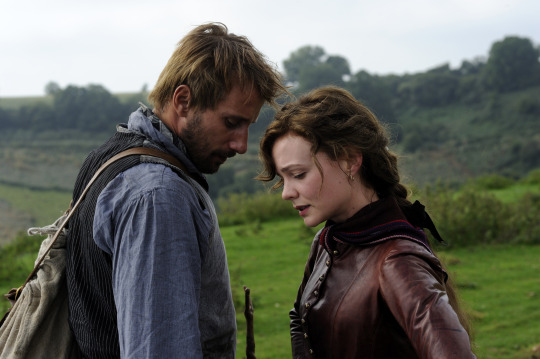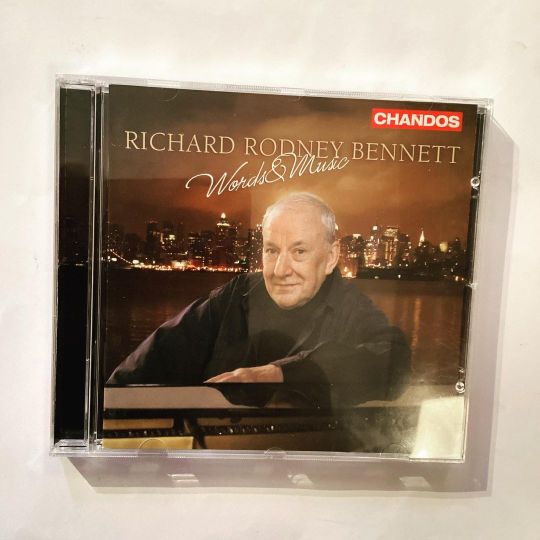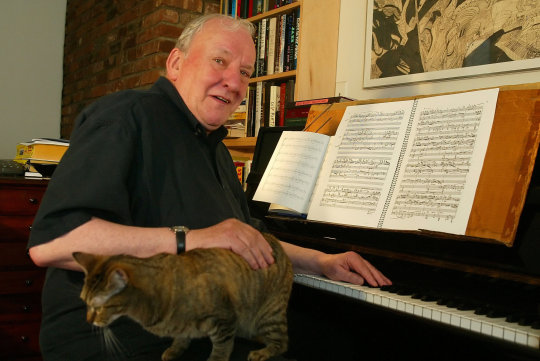#Richard Rodney Bennett
Explore tagged Tumblr posts
Text
youtube
Film composer Richard Rodney Bennett plays a bit of Gershwin on his piano.
#richard rodney bennett#rodney bennett#film composer#composer#composers#piano#jazz#great britain#pianist#music#musician#musciians#cd#cds#cd collector#cd collection#george gershwin#gershwin#Youtube
2 notes
·
View notes
Text

[now-playing] - ost - richard rodney bennett - billion dollar brain - 1967
0 notes
Text
The Creative Person - Richard Williams (1967)
youtube
0 notes
Video
youtube
Richard Rodney Bennett, I Never Went Away
with the Brodsky Quartet, from their album Moodswings
#richard rodney bennett#brodsky quartet#I had forgotten this version#having a real Brodsky Quartet mood today#<3
0 notes
Text

Richard Rodney Bennet was an English composer for film, TV and concerts, and he also performed as a jazz pianist. He received his musical education in England but by 1979, he felt frustrated with life in Britain and he moved to New York. Both Steven Sondheim and Leonard Bernstein wrote in support his application for a US green card.
Bennett produced over 200 works for the concerts, and 50 scores for film and television, including Far from the Madding Crowd (1967); Equus (1977); Four Weddings and a Funeral (1994). And of course by personal favorite, the wonderful score for Murder on the Orient Express (1974) where he was nominated for an Oscar and won a BAFTA.
In 1995, Gay Times nominated him as one of the most influential gay people in music. Three years later Bennett was knighted by Queen Elizabeth.
When asked what was the first thing he did each morning, Bennett replied:
I cuddle my cats, because they always sleep with me.
#gay icons#Richard Rodney Bennet#movie score#murder on the orient express#academy award nominee#BAFTA winner#stephen sondheim#leonard bernstein#gay times#cuddling with cats
23 notes
·
View notes
Text
youtube
Enchanted April is a 1991 British film adapted from Elizabeth von Arnim's 1922 novel The Enchanted April.
music - Richard Rodney Bennett
#enchanted april 1991#enchanted april movie#romantic movie#country living#country life#country aesthetic#spring aesthetic#spring countryside#spring mood#spring life#spring blooms#italy#italian countryside#Miranda Richardson#Polly Walker#Josie Lawrence#Youtube
11 notes
·
View notes
Text
Two Takes on a Hardy Novel

Julie Christie and Alan Bates in Far From the Madding Crowd (John Schlesinger, 1967)
Cast: Julie Christie, Alan Bates, Terence Stamp, Peter Finch. Screenplay: Frederic Raphael. Cinematography: Nicolas Roeg. Production design: Richard Macdonald. Film editing: Malcolm Cooke, Jim Clark. Music: Richard Rodney Bennett.

Matthias Schoenaerts and Carey Mulligan in Far From the Madding Crowd (Thomas Vinterberg, 2015)
Cast: Carey Mulligan, Matthias Schoenaerts, Tom Sturridge, Michael Sheen. Screenplay: David Nicholls. Cinematography: Charlotte Bruus Christensen. Production design: Cave Quinn. Film editing: Claire Simpson. Music: Craig Armstrong.
Almost 50 years separate these two adaptations of Thomas Hardy's Far From the Madding Crowd, and the differences between the two owe as much to film technology as to changing tastes. As always, translating page to film involves compromises. Screenwriter Frederic Raphael remains faithful to the plot, with the paradoxical result that characters become far more enigmatic than Hardy intended them to be. We need more of the backstories of Bathsheba Everdeen (Julie Christie), Gabriel Oak (Alan Bates), William Boldwood (Peter Finch), and Frank Troy (Terence Stamp) than the highly capable actors who play them can give us, even in a movie that runs for three hours -- including an overture, an intermission, and an "entr'acte." These trimmings are signs that the producers wanted a prestige blockbuster like Doctor Zhivago (David Lean, 1965), which had also starred Christie. But Hardy's works, with their characters dogged by fate and chance, don't much lend themselves to epic treatment. David Nicholls's screenplay for the 2015 film is much tighter than Raphael's, and about an hour shorter. Nicholls makes most of his cuts toward the end of the film, omitting for example the episode in which Troy (Tom Sturridge) becomes a circus performer, one of the more entertaining sections of the Schlesinger-Raphael version. I think Nicholls's screenplay sets up the early part of the stories of Bathsheba (Carey Mulligan) and Gabriel Oak (Matthias Schoenaerts) much better, though he has to resort to a brief voiceover by Mulligan at the beginning to make things clear. His account of the affair of Troy and the ill-fated Fanny Robbin (Juno Temple) is less dramatically detailed than Raphael's, but in neither film is their relationship dealt with clearly enough to make us understand Troy's character. John Schlesinger, a director very much at home in the cynical milieus of London in Darling (1965) and Sunday Bloody Sunday (1971) and New York in Midnight Cowboy (1969), doesn't show much feeling for Hardy's rural, isolated Wessex, where the weight of tradition and the indifference of nature play substantial roles. What atmosphere the film has comes from cinematographer Nicolas Roeg's images of the Dorset and Wiltshire countryside and from Richard Rodney Bennett's score, which received the film's only Oscar nomination. And where atmosphere is concerned, Thomas Vinterberg has an edge thanks to technological advances: In Schlesinger's film, despite the fine cinematography of Roeg, the interiors seem impossibly overlighted for a period that resorted to candles and oil lamps for illumination. The change in film technology now makes it possible for us to see the way people once lived -- in a realm of darkness and shadows. (We can almost precisely date when this change in cinematography took place: in 1975, when director Stanley Kubrick and cinematographer John Alcott worked with lenses specially designed for NASA to create accurately lighted interiors for Barry Lyndon. Since then, the digital revolution has only added to the arsenal of lighting effects available to filmmakers.) So cinematographer Charlotte Bruus Christensen's adds an element of texture and mystery to Vinterberg's version that was technologically unavailable to Roeg, and not only in interiors but also in night scenes, such as the first encounter of Bathsheba (Carey Mulligan) and Sgt. Troy (Tom Sturridge), when he gets his spur caught in the hem of her dress. The scene is meant to take place by the light of the lamp she is carrying, which Christensen accomplishes more successfully than Roeg was able to. On the whole, I think I prefer the newer version, which is less star-driven than Schlesinger's, but in the end the best version of the story is Hardy's novel.
#Far From the Madding Crowd#John Schlesinger#Thomas Vinterberg#Julie Christie#Alan Bates#Carey Mulligan#Matthias Schoenaerts
16 notes
·
View notes
Text
A down and out young punk gets a job working with a seasoned repo man, but what awaits him in his new career is a series of outlandish adventures revolving around aliens, the CIA, and a most wanted ’64 Chevy. Credits: TheMovieDb. Film Cast: Otto Maddox: Emilio Estevez Bud: Harry Dean Stanton Miller: Tracey Walter Leila: Olivia Barash Lite: Sy Richardson Agent Rogersz: Susan Barnes J. Frank Parnell: Fox Harris Oly: Tom Finnegan Lagarto: Del Zamora Napo: Eddie Velez Kevin: Zander Schloss Debbi: Jennifer Balgobin Duke: Dick Rude Archie: Miguel Sandoval Marlene: Vonetta McGee Plettschner: Richard Foronjy Reverend Larry: Bruce White Ms. Magruder: Sue Kiel Mrs. Parks: Helen Martin Repo Wife #2: Angelique Pettyjohn Harry Pace: Con Covert Agent B: Biff Yeager Agent E: Ed Pansullo Miner: Jon St. Elwood Sheriff: David Chung U.F.O. Lady: Cynthia Szigeti Otto Dad: Jonathon Hugger Peason: Dale Reynolds Nurse: Dolores DeLuce Mr. Humphries’ Security Guard: Luis Contreras Carwash Attendant: Alex Cox Rabbi: Michael Nesmith Agent S: Steve Mattson Agent T: Thomas Boyd Mr. Humphries: Charles Hopkins Delilah: Kelitta Kelly Motorcycle Cop: Varnum Honey English Dustbin Lady: Dorothy Bartlett Otto Mom: Sharon Gregg Pakman: Jac McAnelly Additional Blond Agent: Jimmy Buffett Additional Blond Agent: Shep Wickham Additional Blond Agent: Gregg Taylor Additional Blond Agent: Jon Fondy Additional Blond Agent: Keith Miley Additional Blond Agent: Michael Bennett Additional Blond Agent: Brad Jamieson Repo Wife #1: Janet Chan Repo Wife #3: Logan Carter Repo Wife #4: Laura Sorrenson First Repo Victim: George Sawaya Repo Victim’s Wife: Connie Ponce Soda Jerk: Bob Ellis Tow Truck Driver: Quentin Gutierrez Liquor Store Clerk #1: Richard Furukawa Liquor Store Clerk #2: ‘Earthquake’ Hesson Nightclub Band Member (as The Circle Jerks): Keith Morris Nightclub Band Member (as The Circle Jerks): Greg Hetson Nightclub Band Member (as The Circle Jerks): Chuck Biscuits Nightclub Band Member (as The Circle Jerks): Earl Liberty Scooter Guys Member (as The Untouchables): Clyde Grimes Scooter Guys Member (as The Untouchables): Chuck Askerneese Scooter Guys Member (as The Untouchables): Kevin Long Scooter Guys Member (as The Untouchables): Jerry Miller Scooter Guys Member (as The Untouchables): Rob Lampron Scooter Guys Member (as The Untouchables): Josh Harris Scooter Guys Member (as The Untouchables): Herman Askerneese Laundry Person: Kim Williams Laundry Person: Michele Person Doctor: Wally Cronin Nurse: Monona Wali Bouncer: Cosmo Mata Club Owner: Rodney Bingenheimer Tennis Player: Jorge Martínez Tennis Player: Melanie Schloss Tennis Player: Nancy Richardson Film Crew: Writer: Alex Cox Producer: Peter McCarthy Executive Producer: Michael Nesmith Producer: Jonathan Wacks Director of Photography: Robby Müller Editor: Dennis Dolan Set Decoration: Cheryl Cutler Original Music Composer: Steven Hufsteter Original Music Composer: Tito Larriva Production Design: Lynda Burbank Art Direction: J. Rae Fox Script Supervisor: Sharron Reynolds-Enriquez Script Supervisor: Brenda Weisman Music Supervisor: Kathy Nelson Stunt Coordinator: Eddie Hice Costume Design: Theda DeRamus Associate Producer: Gerald T. Olson Casting: Victoria Thomas Makeup Artist: Sharon Francis Production Manager: Allen Alsobrook First Assistant Director: Betsy Magruder Second Assistant Director: Rip Murray Construction Coordinator: Douglas Dick Property Master: Douglas Fox Leadman: John Lafia Property Master: Ron Seigel Special Effects: Roger George Songs: Iggy Pop Special Effects: Robbie Knott Stunts: Danny Costa Stunt Double: Thomas Boyd Stunts: Rick Barker Stunts: Fred Scheiwiller Stunts: Rick Seaman Stunts: Michael Sinclair Walter Stunts: Harry Wowchuk Sound Re-Recording Mixer: Richard Beggs Assistant Sound Editor: Christopher Flick Sound Editor: Donald Flick Foley Artist: Kim Fowler Supervising Sound Editor: Warren Hamilton Jr. ADR Editor: Bonnie Koehler Sound Re-Recording Mixer: Michael Minkler Production Sound Mixer: Steve Nelson Foley Artist: John Post Sound Recordist: Philip Rogers Gaffe...
#1980s#Alien#anti-authoritarianism#california#capitalism#car trunk#Conspiracy#consumerism#cult film#dark comedy#economy#genre bending#los angeles#nonconformism#Police#punk rock#radioactivity#repossession#satire#scientist#surrealism#Top Rated Movies#ufo
0 notes
Text
youtube
BBC Concert Orchestra, at the BBC Proms 2011, conducted by Keith Lockhart, playing the Murder on the Orient Express Suite, composed by Sir Richard Rodney Bennett.
Features the opening foxtrot, the train waltz, the finale, and the credits.
What the fuck was that "steam spout" at the beginning of the waltz?
#murder on the orient express#sir richard rodney bennet#waltz#foxtrot#classical music#category: music
1 note
·
View note
Text

Murder on the Orient Express (Sidney Lumet, 1974)
As this film begins - the first big screen version of Agatha Christie's famous murder-mystery novel set on a train, the exotic Orient Express, traveling from Istanbul to Calais - it becomes immediately apparent that we are in for something old fashioned and glamourous. The names of the film's cast appear on a pink satin background during the film's opening credits accompanied by Richard Rodney Bennett's rousing symphonic score. The decision to cast huge stars as the murder suspects was an inspired choice with Sean Connery (as a retired Army Colonel) the most famous at the time although having both Ingrid Bergman (playing a Swedish missionary) and Lauren Bacall (as a crass twice married divorcée) brought the film a touch of class as they both represented an era in Hollywood known for it's elegance and glamour. The story's main character - the famous Belgian detective Hercule Poirot - is played by Albert Finney who physically transforms himself into the role - beady shifty eyes, lathered down greasy hair, a thin very pampered and dramatic moustache, the requisite french accent, a constant stream of bodily tics and extremely annoying countenance. A dream role for an actor to have fun hamming it up which Finney does with great comic delight. The rest of the passengers - a bizzarre group of unrelated characters - who become suspects in the murder of a shady businessman (Richard Widmark) are an aloof Russian aristocrat (Dame Wendy Hiller), her maid (Rachel Roberts), the trian's conductor (Jean-Pierre Cassell), an English governess (Vanessa Redgrave), a Hungarian count (Michael York), his elegant wife (Jacqueline Bisset), the victim's secretary (Anthony Perkins), his valet (Sir John Gielgud), a Pinkerton bodyguard (Colin Blakely) and an Italian car salesman (Dennis Quilley). Helping Poirot in the murder investigation are his friend, the director of the railroad line (Martin Balsam), and a doctor (George Coulouris who had been part of Orson Welles' Mercury Theatre). Tony Walton created the interiors of the train and dressed all the stars in stunning 1930s finery. The film's famous denouement, as in all of the Poirot stories, has him gathering all the suspects together and explaining how the crime was committed and then with a malicious flourish reveal the murderer. The film belongs to Finney who easily dominates every scene but there are equally memorable turns by Bacall, Bergman, Hiller, Roberts and Gielgud who within literally minutes of screen time hold their own opposite the bombastic Finney. The film was nominated for six Oscars - Best Actor (Finney), Supporting Actress (Bergman - who won her third Oscar), Adapted Screenplay, for Geoffrey Unsworth's rich cinematography, Tony Walton's magnificent costumes and for Richard Rodney Bennett's marvelous score - he created a waltz which played as the train moved. Great fun and much better than the recent remake by Sir Kenneth Branagh.
0 notes
Photo

Who the hell did British film composer Richard Rodney Bennett think he was? Cole Porter? The Fabulous Baker Boys?
To my surprise, he was also that. Yes, he got an Oscar nomination in the seventies but I recently discovered that he couldn’t function without jazz and his piano.
And so he toured the cabaret venues to play and sing the jazz standards when he wasn’t working on a composition.
I don’t see any other film composer singing George Gershwin tunes…
https://www.instagram.com/p/CqQXxZfqoy7/?igshid=NGJjMDIxMWI=
#richard rodney bennett#rodney bennett#film composer#composer#composers#piano#singer#singers#pianist#great britain#britain#recital#music#musician#musicians#cd#cds#cd collector#cd collection
2 notes
·
View notes
Video
youtube
Richard Rodney Bennett - Nicholas and Alexandra Suite (1971)
0 notes
Photo

Sir Richard Rodney Bennett (deceased)
Gender: Male
Sexuality: Gay
DOB: 29 March 1936
RIP: 24 December 2012
Ethnicity: White - British
Occupation: Composer, musician, singer
#Richard Rodney Bennett#lgbt history#lgbt#lgbtq#mlm#male#gay#1936#rip#historical#white#british#composer#musician#singer
102 notes
·
View notes
Photo

The murderer is with us now!
Murder on the Orient Express, Sidney Lumet (1974)
#Sidney Lumet#Paul Dehn#Albert Finney#Lauren Bacall#Martin Balsam#Ingrid Bergman#Jacqueline Bisset#Jean Pierre Cassel#Sean Connery#John Gielgud#Wendy Hiller#Anthony Perkins#Vanessa Redgrave#Rachel Roberts#Richard Widmark#Geoffrey Unsworth#Richard Rodney Bennett#Anne V. Coates#1974
3 notes
·
View notes
Video
youtube
Richard Rodney Bennett - Jazz Calendar (1964) The London Jazz Ensemble conducted by John Lanchbery.
19 notes
·
View notes
Video
youtube
Richard Rodney Bennett, “Murder on the Orient Express - Waltz“ (1974)
#Richard Rodney Bennett#English composer#composer#English#Murder on the Orient Express#movie theme#music#1970s#rail
4 notes
·
View notes